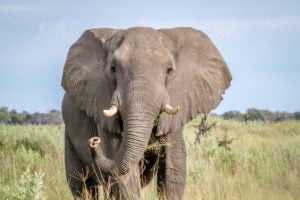
MEXICO CITY, Mexico—Today, leading animal protection organization Humane Society International launched a nationwide petition urging newly elected legislators to protect animals in Mexico’s supreme law, the Constitution. The earlier constitutional initiative by President Andres Manuel López Obrador, set to include specific provisions in art. 3, 4 and 73 of the Constitution to ban animal abuse, grant Congress powers to legislate on animal welfare and establish animal protection as a mandatory education guideline, was effectively paused by the 2024 election season. Now, Humane Society International is rallying the public to revive this crucial constitutional amendment against animal cruelty under the new government.
Millions of dogs and cats roam the streets of major Mexican cities, suffering from cruelty, abandonment, disease and neglect. Mexico is home to billions of animals kept and killed for food, who are confined to cages or crates for months at a time, preventing them from extending their limbs or even walking, and forced to suffer in live transport and inhumane slaughter. As one of the most biodiverse countries in the world, Mexico is also a major source and distribution hub of wildlife for illicit trade; half of the wildlife trafficking seizures at US entry points originate from Mexico, which also supplies illegal markets in Europe and Asia.
Anton Aguilar, HSI Mexico Executive Director, said: “Federal constitution-level safeguards would set a major legal precedent to prioritize animal protection in public policies, foster humane education and phase out cruel fiestas. It would reflect how social attitudes in Mexico have shifted away from cruelty and neglect towards a deep and genuine concern for animal welfare. We call on the incoming legislature, which will take office in September, to swiftly pass this consequential bill to turn Mexico into a leading example of animal protection legislation.”
Animal protection in Mexico has emerged as a significant political focus. This commitment was solidified in 2017 when Mexico City’s constitution recognized animals as sentient beings. Most Mexican states have enacted animal protection laws, incorporating penalties for abuse into their penal codes. Bullfighting has been banned in five states, dogfighting has been criminalized nationwide, and animal testing for cosmetics was prohibited in 2021. Moreover, President-elect Claudia Sheinbaum’s emphasis on animal protection during the presidential debate and her party’s majority position signal a promising path for a constitutional amendment securing animal protection.
Sign the petition urging the new legislature to grant constitutional protection to animals.
ENDS
Media contact: Magaly Garibay, +52 5538762199, mgaribay@idee.agency









